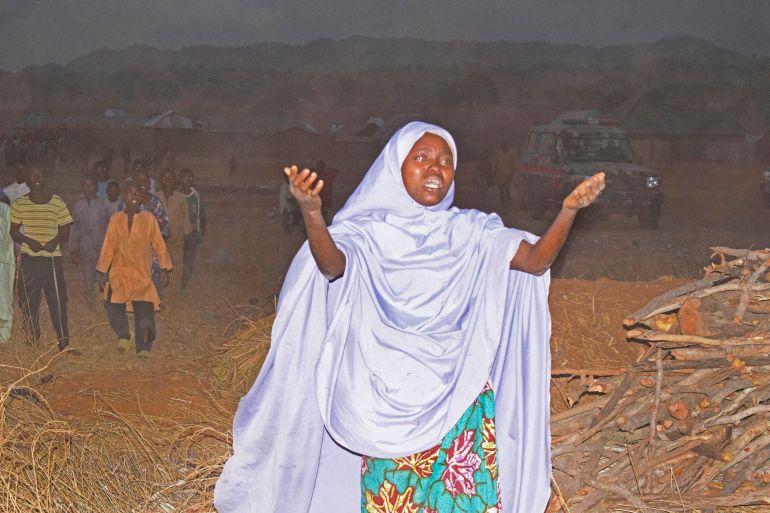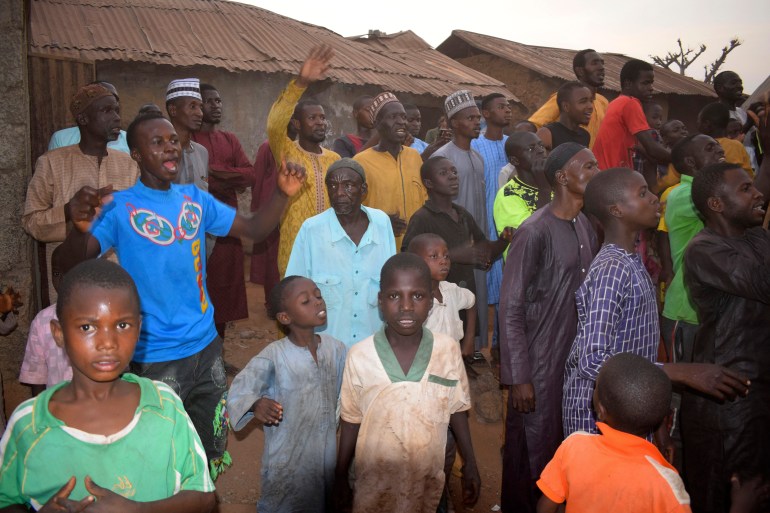Nigeria abduction: Hundreds of pupils missing after gunmen storm school
Search and rescue team deployed to find missing children, a majority of them aged between eight and 15.

Hundreds of pupils are missing after gunmen attacked a school in northwestern Nigeria in the second mass abduction within a week in the country.
Local government officials in Kaduna state confirmed the kidnappings from Kuriga school on Thursday, but did not provide figures as they were working out how many children had been abducted.
Keep reading
list of 4 items‘ECOWAS is making efforts to get across to Niger’: Nigerian defence chief
Photos: Nigerians suffer along border with Niger as economic sanctions bite
Dozens of pupils abducted by gunmen in Nigeria’s northwest
Reporting from the capital, Abuja, on Friday, Al Jazeera’s Fidelis Mbah said school authorities told the state governor that about 25 of the abducted students had been returned to their parents, but 275 remained missing.
Mbah said that about 175 of those still missing are believed to be between the ages of eight to 15.
Nigeria’s President Bola Tinubu on Friday directed security and intelligence agencies to “immediately rescue the victims and ensure that justice is served against the perpetrators of these abominable acts”, his office said.
I have received briefings from security chiefs on the two incidents in Borno and Kaduna, and I am confident that the victims will be rescued. Nothing else is acceptable to me and the waiting family members of these abducted citizens. Justice will be decisively administered.
To…
— Bola Ahmed Tinubu (@officialABAT) March 8, 2024
Police did not provide figures for the abductees.
“As of this moment we have not been able to know the number of children or students that have been kidnapped,” Kaduna state Governor Uba Sani told reporters in Kuriga on Thursday. “No child will be left behind.”
Idris Maiallura, the local councillor for Kuriga, said he had been to the school and that the gunmen initially took 100 primary school pupils but later freed them while others escaped.
Parents and residents blamed the abductions on a lack of security in the area.
UNICEF, the UN children’s agency, condemned the attack and called on the government to do more to protect students.
“Schools are supposed to be sanctuaries of learning and growth, not sites of fear and violence,” UNICEF Nigeria Director Christian Munduate said in a statement.
“This latest abduction, as any previously, is highly condemnable and part of a worrying trend of attacks on educational institutions in Nigeria, particularly in the northwest, where armed groups have intensified their campaign of violence and kidnappings,” Munduate added.
UNICEF is concerned by the reports of abduction of students in Kaduna State.
We urge immediate action to ensure the safe return of the abducted children and staff & call on authorities to implement measures to secure schools across 🇳🇬
Read full statement👇https://t.co/Aw3oiL3tPW— UNICEF Nigeria (@UNICEF_Nigeria) March 7, 2024
Amnesty International called on the authorities to safely rescue the students and hold the perpetrators to account.
“Schools should be places of safety, and no child should have to choose between their education and their life,” the rights group said on X, as it called on the authorities to also “take measures immediately to prevent attacks on schools, to protect children’s lives and their right to education”.
‘The government has neglected us’
“We don’t know what to do, we are all waiting to see what God can do. They are my only children I have on Earth,” Fatima Usman, whose two children were among those taken, told the Reuters news agency by telephone.
Another parent, Hassan Abdullahi, told Reuters that local vigilantes had tried to repel the gunmen, but had been overpowered.
“Seventeen of the students abducted are my children. I feel very sad that the government has neglected us completely in this area,” Abdullahi said.

Kidnappings for ransom are common in Africa’s most populous country, where heavily armed criminal gangs have targeted schools and colleges in the past, especially in the northwest, although such attacks have abated recently.
In 2014, the Boko Haram armed group kidnapped more than 200 schoolgirls in Borno state’s Chibok village.
The last major reported abduction involving pupils in Kaduna was in July 2021, when fighters took more than 150 children in a raid. They were reunited months later with their families after they paid ransoms.
Since coming to office in May, President Bola Tinubu has made reducing insecurity one of his priorities, but the armed forces are embattled on several fronts, including a long-running battle in the northeast of the country.
Al Jazeera’s Mbah said that in recent weeks, Nigeria has seen a spate of attacks and abductions, and the military has stated that they lack the weapons to be able to confront and overpower armed groups.
Chris Kwaja, an associate professor at the Centre for Peace and Security Studies at Modibbo Adama University in northeastern Nigeria, told Al Jazeera on Friday that the frequency of abductions tells an “unfortunate story of the high level of coordination, sophistication and lethality” that defines the criminal organised groups in the country.
There is also a level of complicity within the communities affected that allows kidnappers to know how to undertake such operations, Kwaja said.
The criminal networks can provide incentives to people within communities who do not feel supported by the government and are facing “hunger, starvation, poverty and unemployment”, he added.